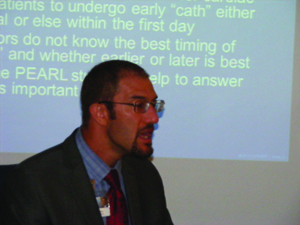unty Board meeting, Dr. Jacob Jentzer, M.D., Pulmonary and Critical Care Medicine, Mayo Clinic, described PEARL, a national research study to learn when best to perform coronary angiogram (heart catheterization) after cardiac arrest. Cardiac arrest is when the heart stops suddenly. Mayo Clinic will participate in the study and expect patients will be involved from surrounding communities. Cardiac arrest is a major cause of death in the United States.
Jentzer defined a heart attack as the sudden closing of an artery that feeds blood to the heart, which can cause cardiac arrest. A heart attack is not always identified after cardiac arrest.
He explained that the current practice is to run an electrocardiogram (ECG) when a cardiac arrest patient arrives at the hospital. If this test does not show a heart attack, the timing of the heart catheterization is decided by the doctor on the case.
Heart catheterization is used to identify and treat heart attack.
PEARL is a randomized study putting patients into two groups, one will receive heart catheterization within two hours after cardiac arrest and the other group of patients will be moved to ICU for stabilization and will receive heart catheterization after six hours. The research is to determine the best timing of heart catheterization, whether earlier or later after a person’s heart stopped beating due to a heart attack. Which poses the greatest risk and/or the greatest benefit?
Jentzer explained that most patients after cardiac arrest are not conscious and unable to give consent to participate in the randomized study. Next of kin may not be available. Therefore, the PEARL study trial will be under FDA approved “exception from informed consent.” This will allow patients to be randomized and included in the study before consent is obtained. This exception is only used for emergency research studies where urgent treatment is considered.
If an individual is opposed to participating in the study trial, he or she can get an “opt out” wristband at no cost. The “opt out” wristband will be recognized as a declined consent. To get the wristband to opt out call (507) 538-7178 or e-mail pearlstudy@mayo.edu or go to www.mayoclinic.org/pearlstudy. Jentzer commented that if a person wants to “opt out” and gets the wristband, it must be with the patient for the declined consent to be recognized.
There will be information sessions at the Rochester Public Library, 1st Floor Auditorium, 101 Second St. SE., on October 10 from 5-6 p.m. and on October 14 from 4-5 p.m..

